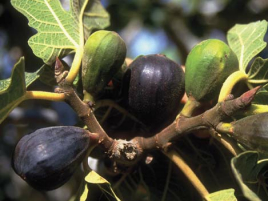Lose Weight And Help Prevent Hypertension With Fig
By Shona Botes | Фев 19, 2011

Figs are originally native to the Middle East and were one of the earliest fruits to be cultivated. Turkey and Greece are currently the world’s main suppliers, with California being the third most important provider of this wonderful fruit. Figs are a member of the mulberry family. They are often more available as a dried fruit, as they tend to deteriorate quickly in fresh form. Either way, they offer amazing health benefits in many areas.
This fruit contains a whopping 250 mg of calcium per 100 grams of fruit, compared to whole milk which only provides around 118mg. They also contain magnesium, copper, iron, phosphorus, Vitamins A, B1 and B2, manganese and potassium, which helps regulate blood sugar levels.
Fibre found in figs is able to assist with weight loss in obese people, but caution should be exercised with regards to overconsumption, as they are also able to lead to weight gain. They assist with bowel function, thereby relieving bouts of constipation.
Figs contain low levels of sodium, which assist with reducing hypertension. Since early times, they have been used to enhance sexual libido. This is done by soaking 2 to 3 of them overnight in organic milk and then by consuming them early the following morning. The potassium found in figs assists with the prevention of urinary calcium loss. They also assist with preventing macular degeneration. They contain large amounts of mucilage, which is able to assist with those who suffer from sore throats or throat infection.
Dried figs contain omega 3, omega 6 and phenol, which are beneficial in helping to reduce heart disease. Their high fibre content assists with the prevention of breast and colon cancers. They are also quite beneficial in treating respiratory problems such as asthma and whooping cough (pertussis). They can assist with the treatment of fevers, boils, abscesses, earache and venereal diseases.
Fig leaves are able to lower triglyceride levels, which can help to prevent obesity and heart disease. Chewing and swallowing fig leaves has been known to help treat ulcers.
Due to their sweetness, they are able to be used as a sugar replacement, and they are often used in the making of jams, pies and preserves.
Learn more: http://www.NaturalNews.com/031384_hypertension_figs.html#ixzz1EOyVWiCK
Learn more: http://www.NaturalNews.com/031384_hypertension_figs.html#ixzz1EOyOA0j2















